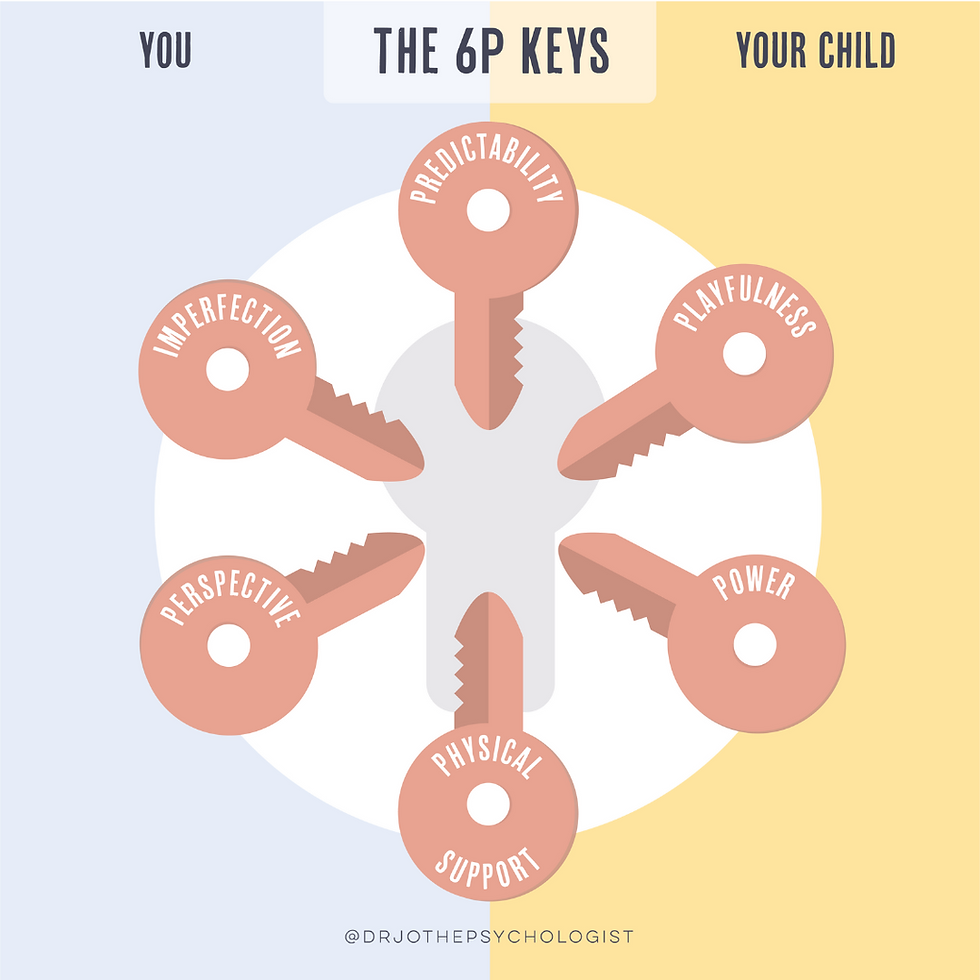7 Reasons I Don’t Use Punishments
- drjothepsychologis
- May 26, 2022
- 4 min read
Updated: Aug 28, 2023

I know what it's like. Your baby turns into a toddler with their own mind. How did that happen! They start experimenting with the world around them and their own autonomy within it. They express their wants, impulses and opinions in a completely new way and it's not always easy to know how to manage things when you need to teach them what's ok, what's safe, what's acceptable... and what's not ok. And when our kids get older, it only gets harder to know how to handle these tricky situations.
We second guess ourselves, we worry we're doing the wrong thing. There's so much information out there and it's hard to know what to trust.
I want to start by saying that no matter what you do, if you've been thinking hard about what's best then I know you are doing a great job for your child.
Below are 7 compelling reasons why I don't recommend punishments to help you manage your child’s behaviour. Punishments are consequences such as time-out (as opposed to time in or calm down time), taking toys or privileges away that are not related to the behaviour, or at the more extreme end, physical harm. They are typically not logically connected to the behaviour and are often poorly thought out, because we use them when we are out of other options. But let me be clear: This post is not meant in any way to add to the pressure or guilt we feel as parents.
We have all used punishments at times with our kids, usually when we have been at the end of our tether. I've been there too. That's ok. What we want to consider is our planned approach, because feeling more confident in this will help us when we're struggling.
There is clearly a huge difference between physically hurting children and using time-out in a considered and effective way. There is no credible evidence that the latter harms children, whilst there is considerable evidence that the former does. What we discuss in this article is nuanced, and it's about what general approach we want to take, and why.
Different things work for different kids. Much of parenting is adapting to each individual child. What I am outlining in this post is a general perspective around punishments versus alternative options. Read more to find out why.
Punishments Paradigm shift
Let's start with a paradigm shift. When we "set boundaries" with our kids, unless we are acting for their immediate safety, we are not laying down a "law" with which we expect they will immediately comply. We are "teaching boundaries". We want to gradually teach them how we would like them to behave (when we look more into brain development, we see why this is important) - just like we teach them all kinds of other skills and information.
Punishments don't fit too well into that framework. But why?
1. Punishments put your child's
brain into a state of threat.
Survival mode means your
child cannot regulate their
behaviour, or learn whatever
you're trying to teach them - so
hier behaviour may get worse
in both the short & long term.
2. Punishments only teach your
child that they were wrong,
they do not teach them
what you want them to do
instead. Children learn by
physically doing,
experiencing, & succeeding -
over & over again.
3. Undesirable behaviour is often
related to under-developed
impulse or emotional regulation
skills. Punishments cannot speed
up the development of these
skills, so your child will likely make
the same mistake again, creating
a vicious cycle of punishment,
stress, & shame for both of you.
4. Due to their developing
prefrontal cortex, children
struggle to connect the
punishments with the "crime"
especially if they not logically
or temporally (time) connected. This
means punishments rarely
prevent a behaviour
happening again.
5. We often use punishments
because WE are dysregulated
angry, upset, panicked, ashamed.
Because we
are out of control,
we tend to be too harsh, then
quickly run out of options when
it doesn't work. We may also be
inconsistent, so our children don't
know what to expect.
6. If punishments do work, it is
often due to them causing
high enough levels of fear &
shame. Most of us do not
want to break down our
connection with our children
by fostering these emotions.
Nor do we want them to
internalise these feelings for
their future.
7. Research shows punishment-
based strategies are
less effective than using
clear, positive, respectful, &
emotionally-attuned
approaches to teach children
how to meet realistic
expectations over time. This is not about "gentle parenting", it's about being loving, firm and clear, while keeping our child's brain development at the forefront of our minds.
But what can I do instead?
I hear you - you don’t want to use punishments. But sometimes you don’t know what else to do when things get stressful. Every parent in the world has been there, yes… even psychologists!

That's why I created the 6P Parenting Keys. It's a step by step toolkit of healthy, evidence-based strategies that work, and help you AND your child stay regulated when setting boundaries.
There are a few different ways you can find out more about the Keys and how they can help you out.
You can download my FREE guide to help you handle the morning routine with calm confidence and see the Keys in action for a well-known tricky situation.
To learn about using the keys in much more detail, check out The Brain-Based Parenting Bootcamp on-demand programme. Suitable for parents of children aged 0-5, it will help you feel more confident.
Lastly, if you're interested in how to regulate yourself as well as your child, have a look at how The Guilty Parent Club could help you.
Can't wait to see you there!

I'm Dr Jo Mueller, a British clinical psychologist specialised in working with parents around parenting and mental health, and neurodivergence.
You can follow me on Instagram @drjothepsychologist for regular tips for parents.
If you'd like to work with me 1:1, you can book a free 15 minute consultation here.

コメント